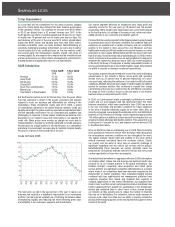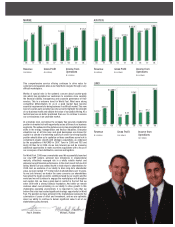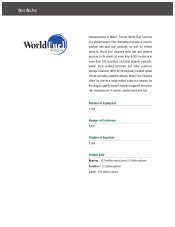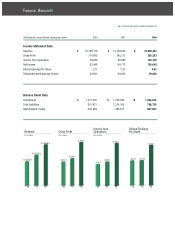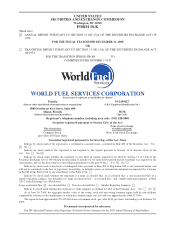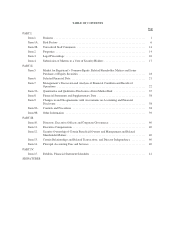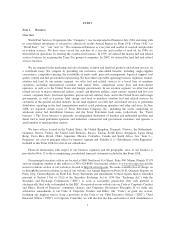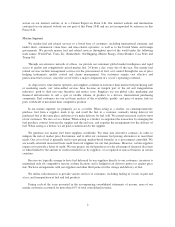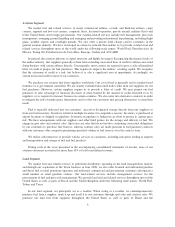World Fuel Services 2008 Annual Report Download - page 12
Download and view the complete annual report
Please find page 12 of the 2008 World Fuel Services annual report below. You can navigate through the pages in the report by either clicking on the pages listed below, or by using the keyword search tool below to find specific information within the annual report.United Kingdom. Our suppliers typically extend us unsecured trade credit for our fuel purchases. Our cost of fuel
is generally tied to market-based formulas. We extend unsecured credit to most of our customers and offer them
fuel-pricing alternatives through our price risk management services.
Fuel is delivered to our customers directly at designated tanker truck loading terminals commonly referred
to as “racks” or directly to customer locations through third party carriers. These racks are owned and operated
by our suppliers or third-party consortiums. We engage in spot sales and contract sales. Spot sales are sales that
do not involve continuing contractual obligations by our customers to purchase fuel from us. Contract sales are
made pursuant to fuel purchase contracts with our customers who commit to purchasing specified volume of fuel
from us over the contract term. We also enter into derivative contracts to offer our customers fuel pricing
alternatives to meet their needs.
During each of the years presented in the accompanying consolidated statements of income, none of our
land customers accounted for more than 10% of total consolidated revenue.
Competitors
Our competitors within the highly fragmented world-wide downstream markets of marine, aviation and land
fuel are numerous, ranging from large multinational corporations, principally major oil producers, which have
significantly greater capital resources, to relatively small and specialized firms. We compete with the major oil
producers that market fuel directly to the large commercial airlines, shipping companies and petroleum
distributors operating in the land transportation market as well as fuel resellers. We believe that our extensive
market knowledge, world-wide presence, extension of credit and use of derivatives to provide fuel pricing
alternatives give us the ability to compete in the marketplace.
Employees
As of February 20, 2009, we employed 1,164 people worldwide.
Regulation
Our current and past activities are subject to substantial regulation by federal, state and local government
agencies, inside and outside the United States, which enforce laws and regulations governing the transportation,
sale, storage and disposal of fuel and the collection, transportation, processing, storage, use and disposal of
hazardous substances and wastes, including waste oil and petroleum products. For example, U.S. federal and
state environmental laws applicable to us include statutes that: (i) allocate the cost of remedying contamination
among specifically identified parties, and prevent future contamination; (ii) impose national ambient standards
and, in some cases, emission standards, for air pollutants that present a risk to public health or welfare;
(iii) govern the management, treatment, storage and disposal of hazardous wastes; and (iv) regulate the discharge
of pollutants into waterways. International treaties also prohibit the discharge of petroleum products at sea. The
penalties for violations of environmental laws include injunctive relief, recovery of damages for injury to air,
water or property, and fines for non-compliance. See “Item 1A—Risk Factors,” and “Item 3 – Legal
Proceedings.”
Forward-Looking Statements
Certain statements made in this report and the information incorporated by reference in it, or made by us in
other reports, filings with the SEC, press releases, teleconferences, industry conferences or otherwise, are
“forward-looking statements” within the meaning of the Private Securities Litigation Reform Act of 1995. The
forward-looking statements include, without limitation, any statement that may predict, forecast, indicate or
imply future results, performance or achievements, and may contain the words “believe,” “anticipate,” “expect,”
“estimate,” “project,” “could,” “would,” “will,” “will be,” “will continue,” “will likely result,” “plan,” or words
or phrases of similar meaning.
4


